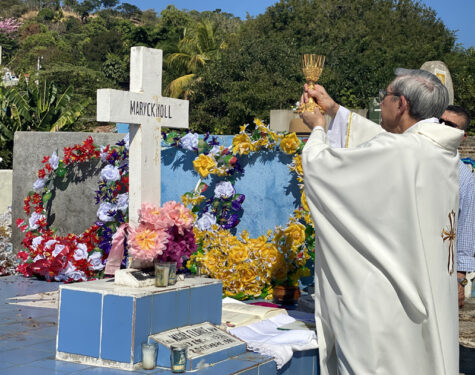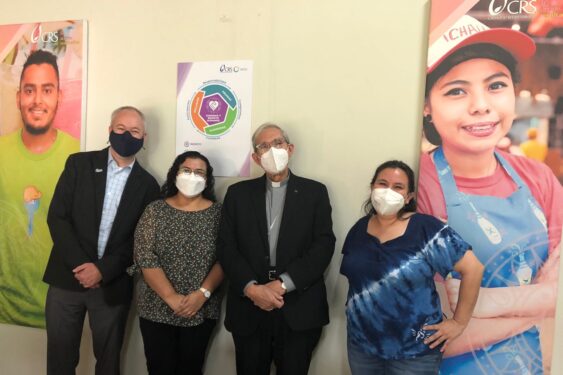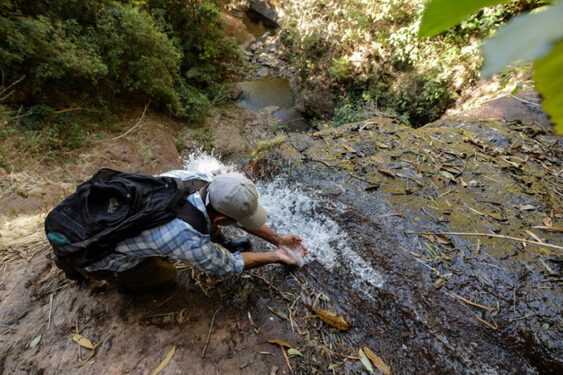
Queens parishioner tells of widespread gang activity
PROSPECT HEIGHTS — It’s the fourth-poorest country in Central America, densely populated with 6 million people living on a landmass the size of Massachusetts. Half of them live in poverty without electricity or running water.
It’s a place still recovering from a 12-year civil war that ended in 1992. There have been back-to-back hurricanes in 2020 that inundated hundreds of homes. Drought, disease, and pests have ravaged the coffee-growing industry. Fearful citizens and merchants fall victim to violent gangs.
Can life in El Salvador be improved for those who can’t — or don’t want to — leave? Catholic Relief Services thinks so.
Sandra Bermudez of Queens is an agricultural engineer who, 21 years ago, came to the U.S. from El Triunfo, El Salvador. Her family now belongs to Presentation of the Blessed Virgin Mary Parish in Jamaica, Queens.
“She personally knows the experience of gangs in El Salvador,” said her son, Damian Bermudez, who translated for her.
“Her brother-in-law was killed by a gang in El Salvador,” he continued. “Constantly, gangs would be coming to her home, demanding money for rent, or they would be killed.
But Bermudez also saw how the Catholic Church, especially local priests, worked to help ease suffering in El Salvador.
She proudly described how her parish priest confronted gang leaders on her family’s behalf and consequently received death threats. The priest later helped the family move to another town.
Therefore, Bermudez agreed that Catholic Relief Services, which operates several programs in El Salvador, is worthy of support. Her observations coincide with the start of the 2022 Rice Bowl Lenten almsgiving program sponsored by CRS.
U.S. Conference of Catholic Bishops created CRS in 1943 to help people reverse long-term crises such as drought or sudden natural disasters.
Onsite Observations
Last month, retired Auxiliary Bishop Octavio Cisneros from the Diocese of Brooklyn got a look at some of the work CRS does in El Salvador. He had initially gone there to represent the USCCB as chairman of its subcommittee of the Church in Latin America.
While there, he celebrated Mass in Chalatenango at the tomb of two Maryknoll sisters murdered in 1980. He also attended the beatification in San Salvador of four men, including Father Rutilio Grande, murdered in 1977.
Still, Bishop Cisneros, who serves on the CRS board of directors, managed to get briefings on their projects.
“I feel that it is good,” he said, “to let them know that behind the work, there are people who are working with them, supporting them in our common faith.”

Crop Diversification
For example, CRS helps Salvadoran coffee farmers enter the lucrative global chocolate industry. CRS helped form the El Salvador Cocoa Alliance with the Howard G. Buffett Foundation, the Ford Foundation, and USAID. The alliance aids farmers to start growing cocoa — an alternative to coffee, which has suffered from increasing fungus and pests.
“Cocoa is very important there,” Bishop Cisneros said. Its production, he added, helps preserve communities and the environment.
As an agricultural engineer, Bermudez has not worked with these crops but noted that her uncle is a scientist who researches cocoa, and she supports diversification.
“It’s a very good idea,” she said. “Our people in El Salvador, they have dreams to grow different crops, but the spaces they have to farm are very small. They just need the knowledge and the help in order to do this.”
Bermudez added that “the Church has helped a lot in this aspect,” making her proud to be Catholic.
Jobs Instead of Gangs
CRS is working to help youth find employment opportunities to address gang violence.
Its “YouthBuildProject” works to replace the lure of gang associations with vocational training and job-placement services. These are ways to eliminate their dependency on violent gangs to make a living in their communities.
YouthBuildProject also teaches entrepreneurial best practices, life skills, and leadership development. Participants apply what they learned in community service opportunities.
“With that comes the work for the youth, the work of education, and the work of the Church for the poor,” Bishop Cisneros said.
Partnerships for Clean Water
But none of these programs matter if people don’t have clean water to drink. Drought and deforestation have spawned a myriad of water supply problems in El Salvador.
Therefore, CRS has joined partnerships to create financing for small cities and rural communities to invest in new or rebuilt water pumps, pipelines, and storage facilities. Other partners are Azure Source Capital and Total Impact Capital.
In El Salvador, Bermudez worked with reforestation projects involving irrigation systems that brought clean water to areas stripped of plant life in the Salvadoran Civil War, which waged between 1979 and 1992.
“A lot of places have been desolate, with not much life, not even animals,” she said. “But these new water sources help a lot in making and growing a community.
“Trees start to grow back, and it gives people more of an incentive to grow their crops and live there again.”
Bishop Cisneros praised what he saw in El Salvador.
“There were about five people who explained to me the different areas of work and how they collaborate with one another,” he said. “And they mentioned, ‘Bishop, we thank you for coming because your presence gives normalcy to our work. But when people acknowledge that we are all working together, we give thanks for one another.’”

